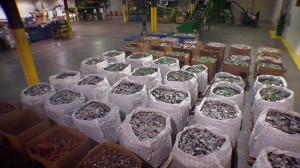SHARP ECO-ETHIC SMACKDOWN
From start to finish Isaac Brown’s Terra Blight is a fantastic, formidable exposé of the intensifying environmental damage caused by the technological revolution of the late 20th century.
Effectively juxtaposing American excess with the poverty of the third world developing countries’”in whose backyards our electronic waste is unceremoniously dumped’”the film makes a simple, direct case for the need to more consciously evaluate our role in an out-of-control cycle of consumerism and waste.
With an extremely well-chosen set of characters, Brown’s documentary uses the voices of the common man to question the ethics of technologic creation and destruction. Instead of targeting the corporate and government officials behind these policies, he focuses his lens entirely on the ordinary people affected by them, both here in the U.S. and as far away as Ghana, West Africa.
At a dumpsite in Ghana, child metal scavenger Isaiah Attah picks his way through endless piles of debris, throwing rocks at antique desktop monitors to break away the glass and expose the metal wiring, which he collects to sell so he can pay for a day at school. Clad in shorts, a t-shirt, and slippery flip flops, he explains that kids often get tetanus doing this kind of work, because they frequently get infections from cuts obtained handling contaminated glass and metal shards. Another youth says he lost three of his friends to equipment that exploded while they were trying to break it down.
In contrast to this deeply upsetting reality we are shown America, where over two hundred thousand computers are purchased daily’”and roughly the same number are thrown away. We see members of the middle class who wait in line for hours to get good deals on new models of computers, televisions and cell phones’”because they’re hoping for a tax break, because they need new software to keep up with their online gaming addictions, or just because they can.
Brown uses his subjects’ clear voices to make his argument rather than employing a narrator; he is wise to understand that over-explanation or righteousness could very well alienate his viewers. The visual storytelling is as strong as the script itself, with seamless editing and good use of animation (Brown with David Montgomery). Particularly powerful is the footage shot in Ghana, where a beautiful lagoon is contrasted with the disgusting wasteland created by American electronic dumping, and where a dumpsite worker lights a cigarette on a small mound of burning equipment. The soundtrack, credited to Daoma, Faso Yiriba Culture, and Isaac Brown, is eerily like an electronic heartbeat, a hybrid of man and machine. Is man still in charge of technology, or has it begun to control him? As the final piece of stock footage states, “The task that is set and the data that is given must be man’s decision, and his responsibility,” yet it seems to be a responsibility he avoids looking in the eye.
The film does an excellent job of exposing an unethical system of electronic waste disposal. When the United States Environmental Protection Agency finishes with a computer, they protect the environment in America by shipping it to Africa. As noted by one of the European women visiting the Ghana dumpsite, this is “environmental racism at its best.”
Even here in the U.S., electronic waste has wreaked havoc. In a segment that recalls Paul Jacobs and the Nuclear Gang (a documentary in which Saul Landau and Jack Willis interview U.S. citizens exposed to radiation by the 1950’s Nevada atomic bomb testing), residents of Endicott, New York share horror stories of contaminated water and increased incidences of cancer in local young adults. Wanda Hudak, an IBM nurse, lists the large number of chemicals released by IBM into the environment, concluding: “Nationally, we are a hidden chemical time bomb.”
Very well-directed, edited, and shot, the film succeeds in holding one’s attention and empowering with information.
Terra Blight
Jellyfish Smack Productions
USA, 54 min., no rating
available on VOD; to view film, visit http://www.FilmBuff.com





